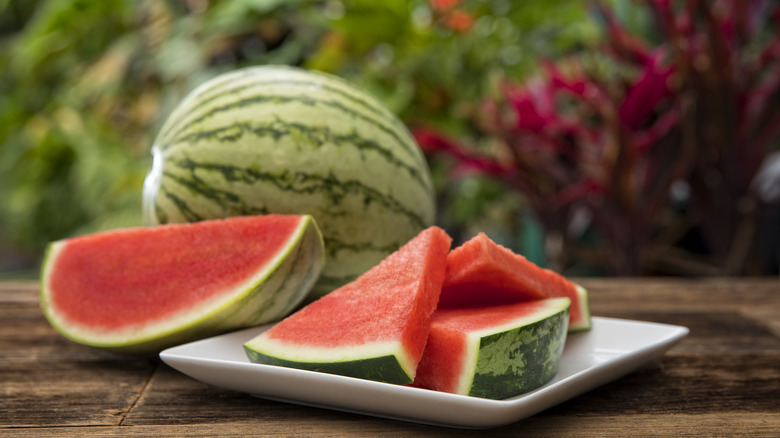Why Your Watermelons May Run The Risk Of Exploding
Watermelon, which has far more types than you might think, is probably the most iconic summer fruit (or technically vegetable); it's light, refreshing, and a perfect complement to those heavier summer barbecue dishes. So maybe it's your next cookout, everyone's having a great time, the brisket was a huge hit, and it's time to wind down with a refreshing snack. "Great," you think, "I'll just go grab the watermelon I've been keeping for just such an occasion." So you head to your fruit cellar (is that a thing?) and pick up your giant watermelon, ready for a great end to the evening.
And then — it explodes. It literally just explodes right in your face. As you stand there covered in watermelon guts, picking seeds out of your ears, you might justifiably wonder what in the world just happened. Well, it turns out you weren't the victim of a cruel prank by a neighbor putting an M-80 in your summer fruit. Sometimes watermelons can just do that on their own.
Fermentation can wreak havoc and cause your watermelons to go off
The problem here is fermentation. As fruit gets older, it starts to ferment, essentially rotting from within as bacteria starts working, breaking down all the sugars it can get its cells on and converting them to alcohol. This introduces carbon dioxide to the inside of the melon, whose thick shell creates a pressurized environment not unlike that of a can of Dr. Pepper. It's pretty much an identical principle to shaking a can of soda and then opening it. Fermenting is a necessary part of the beer- and wine-making process, and you can ferment foods at home, but you definitely don't want it anywhere near your melons.
And while sometimes this resolves itself when a crack forms and the gases get let out slowly on their own, sometimes ... well, sometimes it just detonates. We're not talking explosions like with a sausage, where the end ruptures and it's disappointing. We're talking an actual loud bang here, complete with watermelon debris coating your walls, like a ghost Gallagher snuck in and went to town.
There are ways to mitigate the problem, but it can still just happen sometimes regardless
As far as how to avoid it, well ... you can't, not entirely. This is just a thing that sometimes happens. If you see your watermelon foaming, get rid of it immediately. But you can mitigate the problem by storing your watermelon in your fridge right from when you get it; the cold will slow (if not entirely stop) the process.
Your fridge doesn't solve the problem entirely, though. Heat exacerbates the issue, which is why there have been more reports of this phenomenon lately: It's been really, really hot out. But it's not just that this happens to fruit you've left out too long; sometimes it's just got issues from the jump, and you'll have an exploding snack on your hands the day after you purchase it. The only real way to deal with this issue is to monitor your watermelons closely.
Maybe you can't avoid it, but this is also one of the few sides you can have an explosion in your house and not deal with emergency services needing to be contacted. And on the plus side, it makes for one heck of a story.


